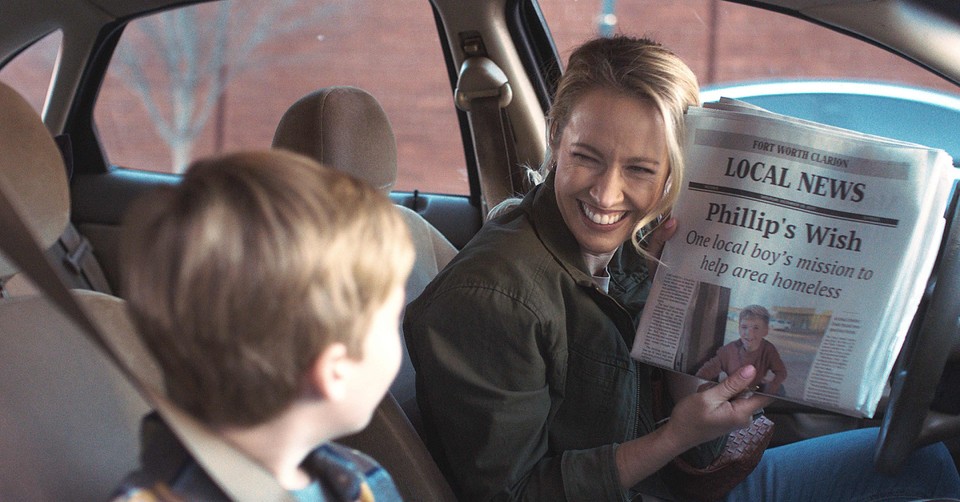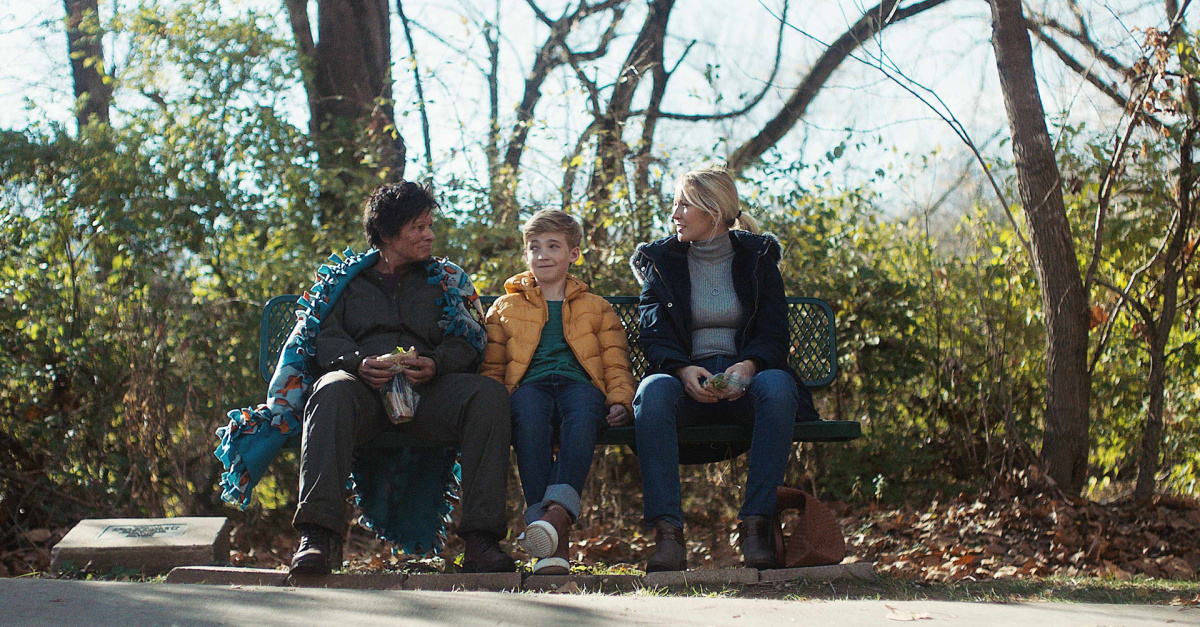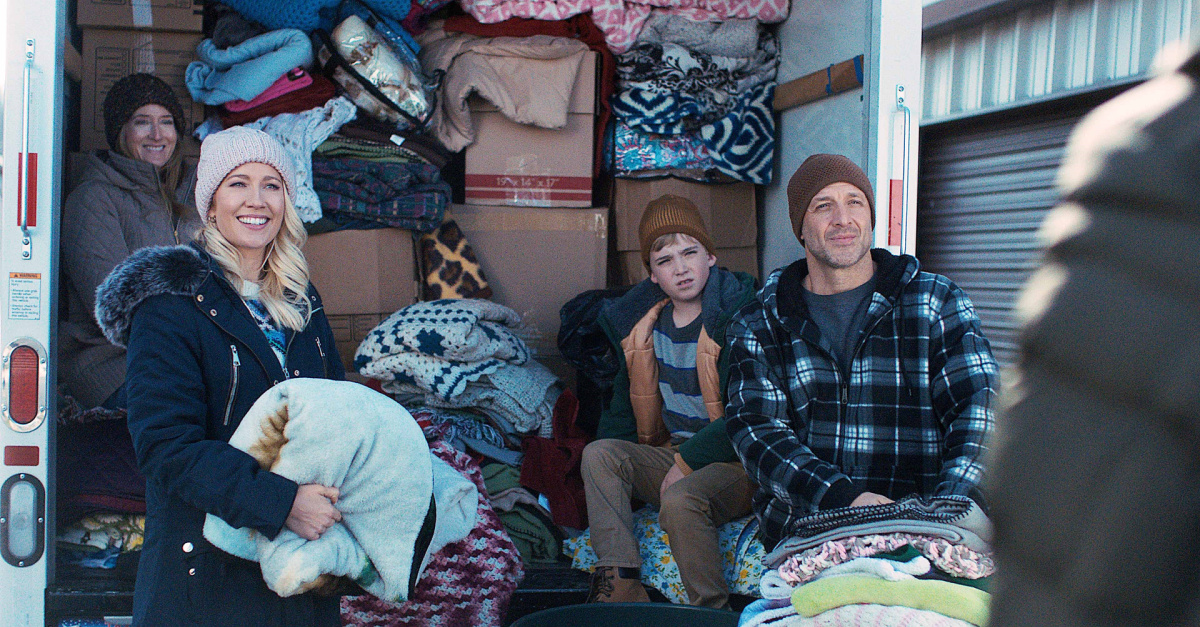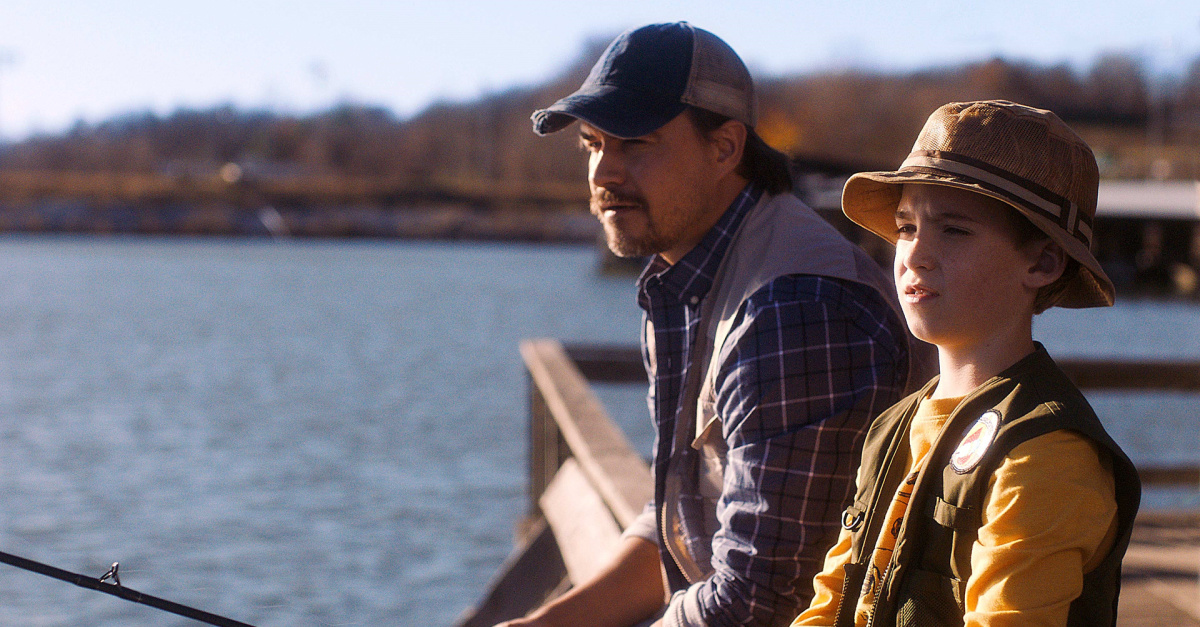3 Things You Should Know about 5000 Blankets, the Faith-Based Film about Homelessness

Cyndi is an optimistic, outgoing mom who only wants what is best for her husband, Bobby, and young son, Phillip. She organizes birthday parties. She makes sure they're in church. She tends to her son's needs at school.
On the surface, they're living a near-perfect life as a family in Fort Worth, Texas.
But all that changes when Bobby suffers a mental breakdown at a party and then at work. It makes him unable to communicate. It's as if -- she says -- there's a "darkness hanging over him."
The situation grows direr when Bobby hops in his vehicle and drives away without telling his family where he is going. He doesn't answer his phone. He doesn't respond to messages. Cyndi suspects he is living on the streets, homeless and seemingly hopeless.
Will he ever return?
The new faith-based movie 5000 Blankets (PG-13) follows the story of Cyndi, who initially fails in her attempt to find Bobby but is inspired to help Fort Worth's homeless community.
Here are three things you should know:
Photo courtesy: ©Affirm, used with permission.

1. It's Inspired by a True Story
5000 Blankets is based on the true story of Cyndi Bunch, whose husband, Phillip Sr., suffered a schizophrenic breakdown two decades ago and ran away to live on the streets. (Phillip Sr. had stopped taking his medication.) At the time, her son Phillip Pruitt was five years old.
"I didn't really know what was going on at the time because my mom was hiding a lot of it," he said.
At first, the young boy only wanted to help his dad. But when he learned about other homeless people on the streets, he wanted to help them, too.
Phillip's goal was to collect thousands of blankets for the homeless of Fort Worth, Texas. He even gave his mother his piggy bank.
Phillip's goal led to the founding of a non-profit homeless charity, Phillip's Wish, that collects not only blankets but also much-needed items for the homeless community.
Cyndi Bunch credits God for the idea.
"The good Lord was definitely looking down on me," she told Channel 5 in Dallas-Fort Worth.
Photo courtesy: ©Affirm, used with permission.

2. It's about Faith, Hope and Love
The film tackles a tough subject, mental illness, with sensitivity and compassion. We watch as Cyndi's husband, Bobby (his movie name), suffers a mental breakdown at work. (Through images and sound, we experience what he experiences.) Moments later, he's standing on the building rooftop, apparently ready to jump to his death, when Cyndi calmly persuades him to walk to safety. Within minutes, though, he drives away in the family vehicle, perhaps never to be seen again.
"My husband is not well," she tells the police, who respond by saying they can do nothing because he "left on his own volition."
But Cyndi refuses to give up on her husband. She hangs "missing person" fliers around the city. She searches the streets. She interviews the homeless, asking if they've seen him. As she talks to Fort Worth's homeless – and as she listens to her son – she is inspired to collect blankets for the community.
The film includes plenty of faith-based moments. We see her at church. We watch as her pastor visits the home and encourages her to allow the congregation to assist the family's needs. (Because of her husband's absence, she is forced to sell their house and find a job outside the home.) Eventually, Cyndi stands before the congregation and gives her testimony, urging the body of Christ to help her collect the thousands of blankets that are needed.
The film is a lived-out example of what the Apostle Paul described in 1 Corinthians 13: "Three things will last forever – faith, hope, and love – and the greatest of these is love." Cyndi had faith and hope in spite of her circumstances. She loved Bobby in spite of what he had done. She found purpose in the midst of a gut-wrenching tragedy.
The movie, brilliantly written, urges us to have compassion for Bobby, the homeless, and their families, all at the same time.
"We didn't ask for any of this," she tells her son, "but we get to choose how we react."
Photo courtesy: ©Affirm, used with permission.

3. It's about the Image of God in All of Us
5000 Blankets soars in its depiction of the homeless. They're not problems to be brushed aside but, instead, image-bearers of God who need grace and mercy. Asked what his biggest challenge is in reaching the homeless, Phillip Jr. says it's "making people see what they usually try hard not to see."
We watch as Cyndi's character is transformed. During the film's opening scenes, she ignores a homeless man who knocks on her vehicle window, requesting money. (Phillip rolls his window down and hands him a dollar.) It's only when the issue is personalized that Cyndi changes her attitude. She takes a middle-aged homeless woman to a late-night diner. She invites two homeless men to a spaghetti fundraiser. She learns about their past, their life, and their dreams. She also learns more about their path to homelessness. (One homeless woman says she gave up on life after her husband died.)
Anna Camp (The Help, Pitch Perfect) and Carson Minniear (Palmer) are believable and outstanding in the lead roles.
The real-life Cyndi Bunch says she wants the movie to change viewers' perspective on homelessness.
"You don't know what's going on in people's lives," Bunch told Channel 5. "... They're people. They're human beings. I met so many beautiful spirits out there in those streets."
5000 Blankets is Rated PG-13 for thematic material involving mental illness. It contains no coarse language.
Entertainment rating: 4 out of 5 stars.
Family-friendly rating: 4 out of 5 stars.
Photo courtesy: ©Affirm, used with permission.
Michael Foust has covered the intersection of faith and news for 20 years. His stories have appeared in Baptist Press, Christianity Today, The Christian Post, the Leaf-Chronicle, the Toronto Star and the Knoxville News-Sentinel.
Listen to Michael's Podcast! He is the host of Crosswalk Talk, a podcast where he talks with Christian movie stars, musicians, directors, and more. Hear how famous Christian figures keep their faith a priority in Hollywood and discover the best Christian movies, books, television, and other entertainment. You can find Crosswalk Talk on LifeAudio.com, or subscribe on Apple or Spotify so you never miss an interview that will be sure to encourage your faith.
Originally published December 15, 2022.




